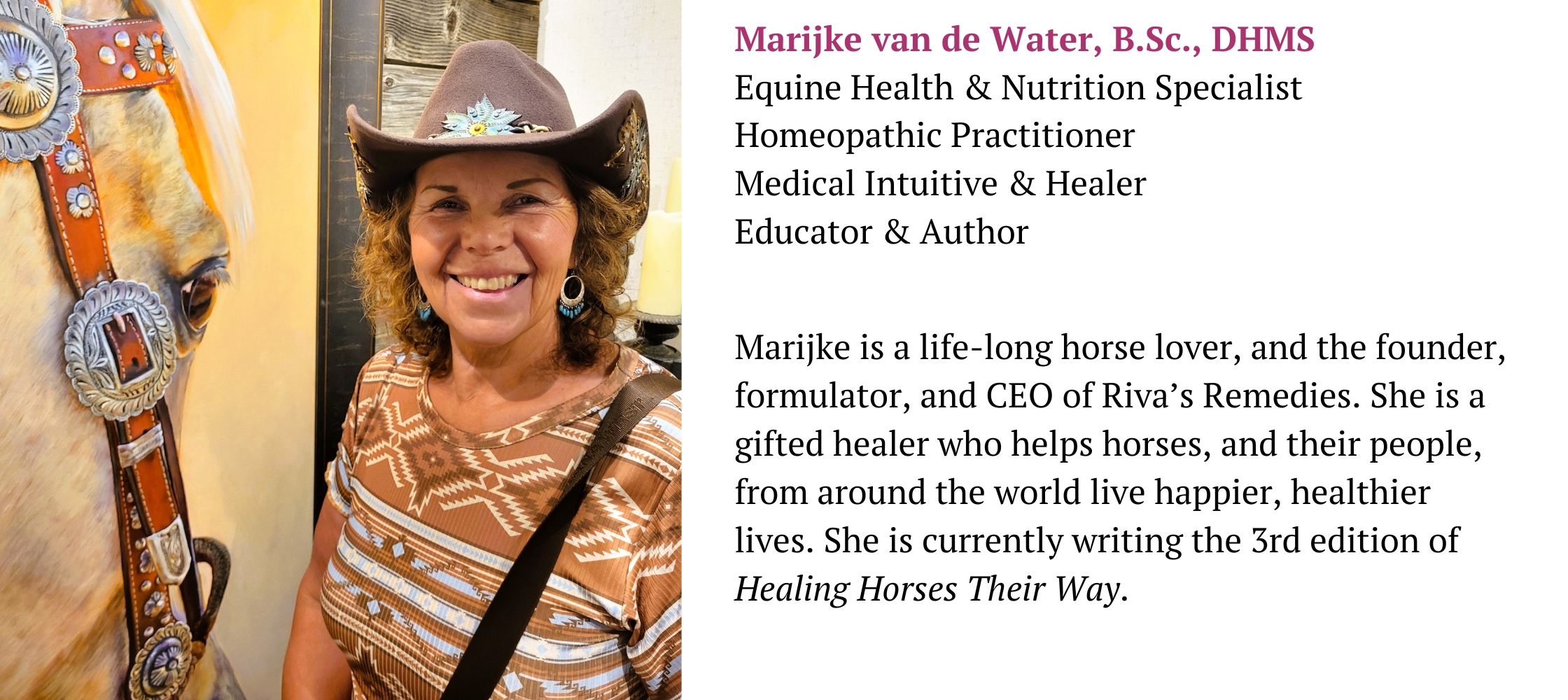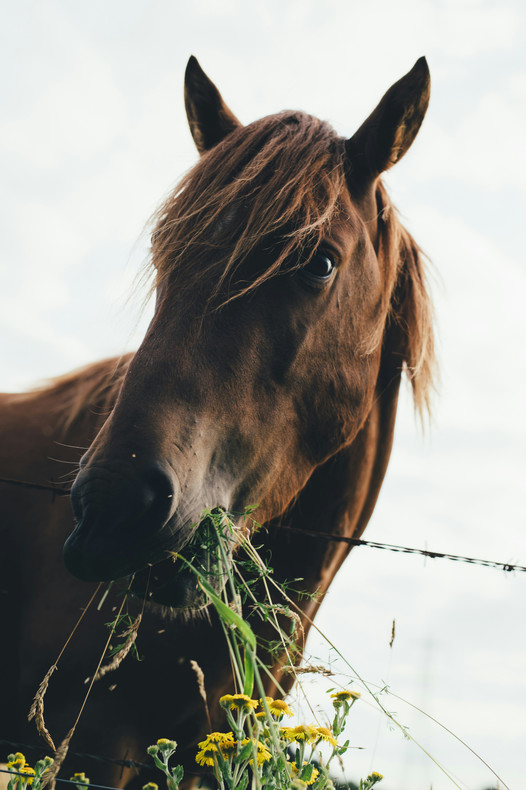There are a lot of horses out there having problems with Fecal Water Syndrome (FWS) and we hear from concerned horse owners on a regular basis. Horses everywhere are prone to many different digestive problems of course, but FWS, which is also called Free Fecal Liquid (FFL) is on the rise. Similar to many other horse health issues, FWS is associated with a domestic lifestyle. It can be a persistent problem but by understanding some of the root causes and underlying issues there are various ways that we can help them firm up the contents of their hindgut.
Equine Fecal Water Syndrome (FWS), also known as Free Fecal Liquid (FFL), is increasingly affecting horses everywhere, and we hear from concerned horse owners on a regular basis. While horses commonly face various digestive issues, FWS stands out as a rising problem associated with domestic lifestyles. Understanding its root causes and underlying factors is crucial, as it can persist and impact the horse's hindgut health. However, there are several strategies available to assist horses in firming up the contents of their hindgut, thus mitigating the effects of FWS.
So, let’s take a look at the details of FWS and provide some natural horse health solutions to offer you and your horses some relief.
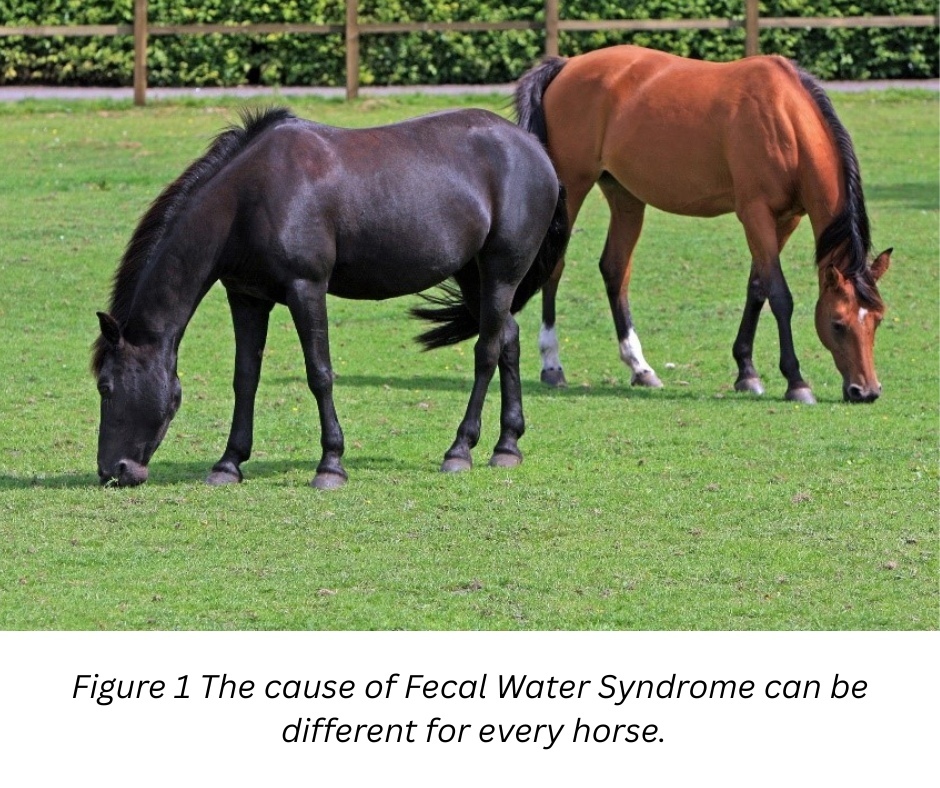
What is Fecal Water Syndrome?
Diarrhea, or any kind of loose watery manure, is passed when digested feed matter moves through the hindgut too quickly. Because the matter passes through at an accelerated rate, there is not enough time for the fecal water to be reabsorbed out of the hindgut and back through the intestinal membranes and the rest of the body.
Equine Fecal Water Syndrome is a type of diarrhea. It describes a condition where the solid manure is passed normally but the horse is passing fecal liquid separately from the solids, either before, after, or in between. It can last for a few days or become chronic lasting for several weeks or months. No matter the duration, horses, and their caretakers don’t like fecal matter stuck to the buttocks and back legs (especially in the winter), staining of the haircoat, and messy stalls and paddocks. Watery stools can also cause skin issues and attract more insects. But horses with FWS usually don’t have any other clinical signs such as appetite changes, digestive discomfort, or weight loss.
No matter the duration, cleaning your horse’s tail, buttocks, and hind legs – especially in the winter – can be very frustrating for you and your horse!
What Causes FWS?
There are several reasons why horses may have an excess of fecal water. And each horse can be different from the next. So, as you read through these different causes you may recognize the problems that are affecting your horse.
Poor Digestion and Leaky Gut
Poor digestion is a common cause of hindgut issues including diarrhea and chronic loose stool. Any feed or forage which is mal-digested in the foregut results in toxins, debris, over-fermentation, and bacteria. These issues can be caused by overfeeding grains, commercial feeds, fats, poor quality hay, or alfalfa. When partly digested food materials enter the hindgut, the body recognizes that it should expel these problem particles as quickly as it can. Otherwise, they will unbalance the microbiome and damage the intestinal membranes, eventually resulting in leaky gut.
In advanced cases of leaky gut, water, and electrolytes (minerals with an electrical charge) will leak from the body tissues back into the colon, which then results in diarrhea or FWS. New pasture growth in the spring is also a factor; grass is lush and contains a lot of water. So, if the hindgut cannot absorb all that water at once, the liquid will flow through the cecum and colon too quickly. As well, horses with inadequate dietary fibre, as is the case on grass diets for example, may have feces with less water-holding capacity. And other horses may improve on grass because they are intolerant to certain hay types. If such an intolerance is suspected, it is important to try different hay types to find compatibility.
Senior horses are especially prone to FWS since the overall digestion is less efficient and dysbiosis is more common than in younger horses. And they may be more sensitive to intestinal toxins.
Changes in Diet
Changes in diet, including transitioning from grass to hay or hay to grass, or even the addition of a new kind of feed, can disrupt the hindgut microbiome because if these changes are made too quickly, the microflora don’t have time to adapt causing dysbiosis. Whenever there is a feed change, different species of beneficial bacteria are required for fermentation. Diet changes, therefore, should be done slowly and gradually. And they may need to be accompanied by an effective probiotic supplement.
Salt
Some horses will have a hindgut reaction to salt, even with small amounts. Salt binds to water through a process of osmosis, which is the movement of water or some other solvent from a dilute solution to a more concentrated solution. This is how salt helps maintain the balance of fluids inside and outside of the tissue cells. But if salt accumulates in the intestinal tract, water will be drawn out of the intestinal membranes, which are semi-permeable, and into the intestinal tract. Therefore, too much salt will attract too much water and cause diarrhea or fecal water syndrome.
process of osmosis, which is the movement of water or some other solvent from a dilute solution to a more concentrated solution. This is how salt helps maintain the balance of fluids inside and outside of the tissue cells. But if salt accumulates in the intestinal tract, water will be drawn out of the intestinal membranes, which are semi-permeable, and into the intestinal tract. Therefore, too much salt will attract too much water and cause diarrhea or fecal water syndrome.
This exact thing happened to one of my senior horses who was twenty-four at the time. I noticed that he was craving the salt block, so I added one teaspoon of Himalayan salt to his mash. And each time that he lost interest in the salt block, I would discontinue adding the salt. But even at that rate, it wasn’t long before he was passing fecal water and messy manure too. On one teaspoon!
Excess salt can also cause thirst, water retention (edema), bloating, and kidney stress since the kidneys are responsible for removing extra sodium from the blood. This is why I normally recommend allowing horses to free feed salt, rather than adding it to the mash. And finding the right salt that they tolerate best.
Fertilizers
Nitrogen-based fertilizers can cause diarrhea or FWS. The more nitrogen applied to the hay crop, the higher the risk of toxicity. In addition, fertilized pastures have a higher non-digestible fibre content, which could aggravate sensitive horses.
I have not found any herbs or supplements that can overcome the adverse effects of nitrogen. Therefore, changing the hay is usually the only option. Where possible, if you grow your own hay crop, it is better to focus on quality rather than yield, which requires more nitrogen. And never allow your horses to graze on a recently fertilized field.
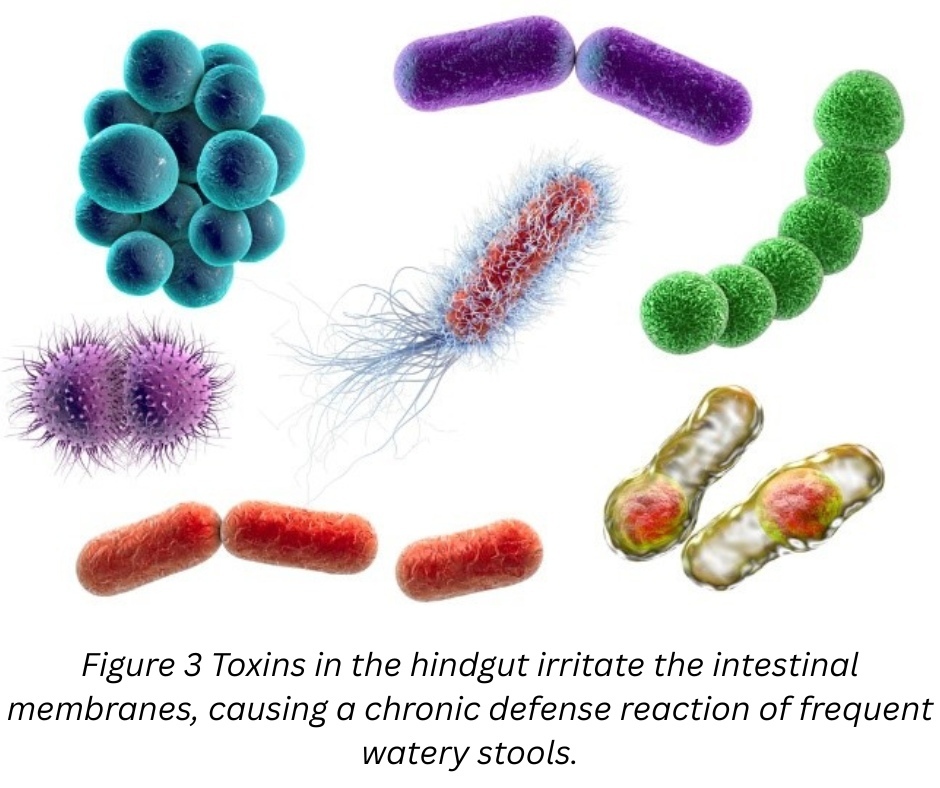
Parasites
Parasite loads are common, even in horses who are treated with a full tube of chemical dewormers twice per year. Parasite resistance, inappropriate dewormers, and horse-keeping practices are all part of the parasite problem. In addition, most horse owners don’t make use of fecal analyses to determine what kind of parasite loads their horses have and if their current deworming program is working or not. Parasites can cause a lot of digestive trouble including leaky gut, diarrhea, FWS, and poor immunity.
Malabsorption Syndrome
Malabsorption syndrome, while not technically FWS, should be suspected if the fecal water becomes chronic and accompanied by weight loss. Horses with malabsorption syndrome are unable to absorb nutrients from the small intestine due to faulty villi (absorption cells) in the lining. If protein levels drop, water may accumulate (edema) in the lower abdomen, giving the horse a “hay belly”. Malabsorption syndrome can be due to problems eating or digesting forage or feed, bacterial infections, parasite overloads, liver toxicity, and nutrient deficiencies. Always do a dental check, as well.
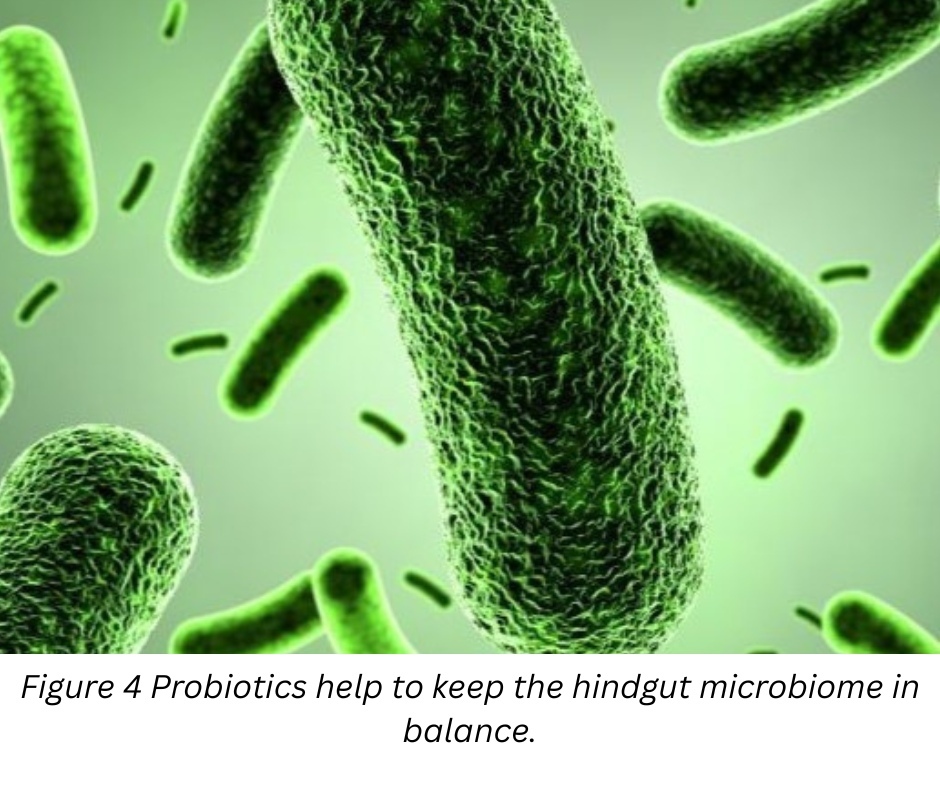 Probiotic Deficiencies
Probiotic Deficiencies
Billions of strains of microflora are required to keep the microbiome in balance, which is extremely important for maintaining gut health as well as the intestinal immune system. There are a number of factors that can create dysbiosis including diet, exercise, stress, seasonal temperatures, poor digestion, and the diarrhea itself. In almost all cases of FWS, the health program should include a good quality probiotic that requires refrigeration to ensure maximum potency.
Emotional Distress
Nervousness, anxiety, fear, and stress affect the intestines perhaps more than any other organ. Acute anxiety immediately causes the colon to evacuate, which is why we see manure everywhere (oftentimes wet manure) during competition, training, transport, and any kind of trauma. Chronic stress also affects digestion as it not only upsets the microbiome but causes muscle tension and increased peristalsis in the hindgut. Horses are masters at hiding their emotions and their stress levels, so we have to be very astute to understand what may be bothering them so we can take the appropriate action.
Recommended Natural Health Program for FWS
The body is always looking to balance itself and so eliminating waste faster than normal should be considered as a defense mechanism the body uses to rid itself of irritants and toxins that could damage the intestinal membranes. Maldigested feed, chemicals, medications, feed additives, fertilizers, sand, bacteria, yeast, viruses, and parasites can all trigger a digestive response. Therefore, the key is to restore digestive health through diet and detoxification, and the reduction of stress levels. Nutrient deficiencies can also affect the health of the hindgut as can feed sensitivities.
Diet Changes and Lifestyle Tips
- Assess the feed program, including the hay.
- Be mindful of too much magnesium or vitamin C, both of which can be natural laxatives.
- Do a dental check.
- Do fecal tests to determine parasite load.
- Eliminate grain and grain alternatives.
- Ensure adequate exercise.
- Introduce new feed programs slowly, including switching from grass to hay and from hay to grass.
- Reduce stress levels.
- Be mindful of bacteria and viruses.
- Test the manure for sand.
High Fibre Feeds
- Psyllium seed or husk: Start with 1 to 2 tsp dissolved in one cup of water and increase to 1 Tbsp dissolved in 2 cups of water. Start slowly to ensure that your horse tolerates it since some horses will get gassy and bloated, in which case it should be discontinued.
Psyllium forms a gel-like substance, which absorbs excess water and helps to cleanse the colon of irritants, sand, and foreign materials including maldigested feed.
- Rice bran: 1 to 2 cups daily, but only as long as needed since it is higher in fat.
It has a high fibre and fat content, which can help some horses by absorbing water and slowing down gastro motility. Some horse owners also have success with soy hulls, which are lower in fat but high in fibre.
- Beet pulp, soaked: 1 to 3 cups daily
Beet pulp is high in absorbable fibre in the form of digestible pectin. It can help to absorb water and slow down gastro motility. Also helps with satiety.
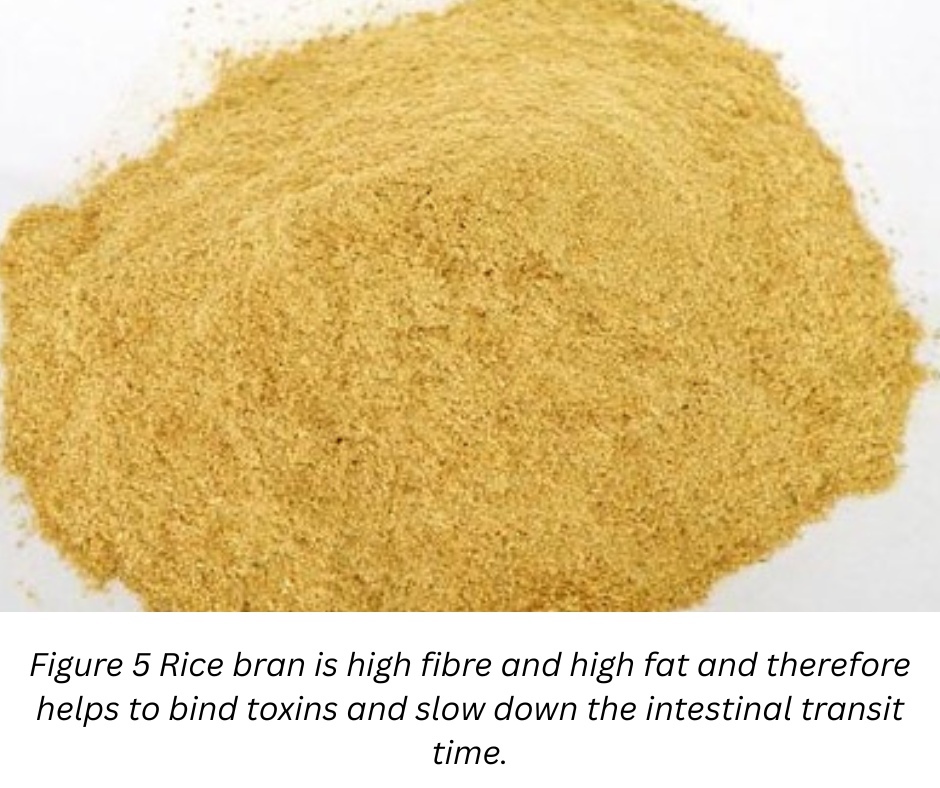
Recommended Supplement and Remedy Program
 Baking soda: 1 to 2 Tbsp daily - Reduces acidity, which favours pathogens and toxins and aids leaky gut.
Baking soda: 1 to 2 Tbsp daily - Reduces acidity, which favours pathogens and toxins and aids leaky gut.
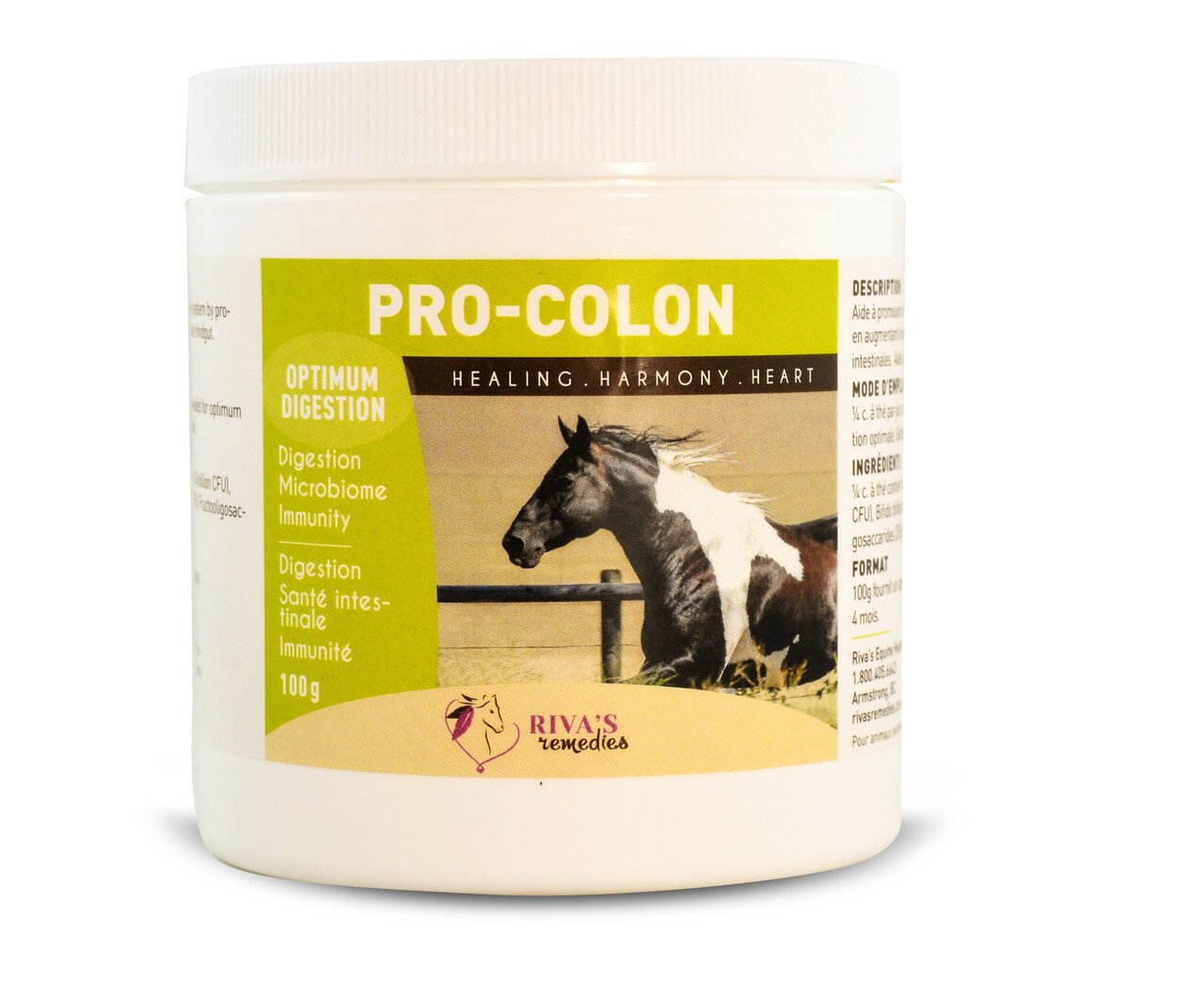 Pro-Colon: ¼ tsp daily - Pre- and probiotics, which supports a healthy microbiome, nutrient absorption, and the intestinal immune system.
Pro-Colon: ¼ tsp daily - Pre- and probiotics, which supports a healthy microbiome, nutrient absorption, and the intestinal immune system.
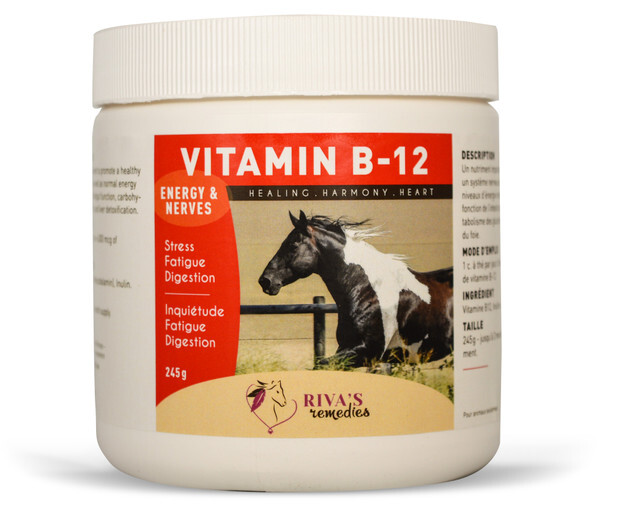 Vitamin B12: 1 tsp daily (1 tsp = 6,000 mcg) - Supports gastric digestion and hindgut health, including the microbiome. Maintains a healthy nervous system, liver detoxification, and normal carbohydrate metabolism.
Vitamin B12: 1 tsp daily (1 tsp = 6,000 mcg) - Supports gastric digestion and hindgut health, including the microbiome. Maintains a healthy nervous system, liver detoxification, and normal carbohydrate metabolism.
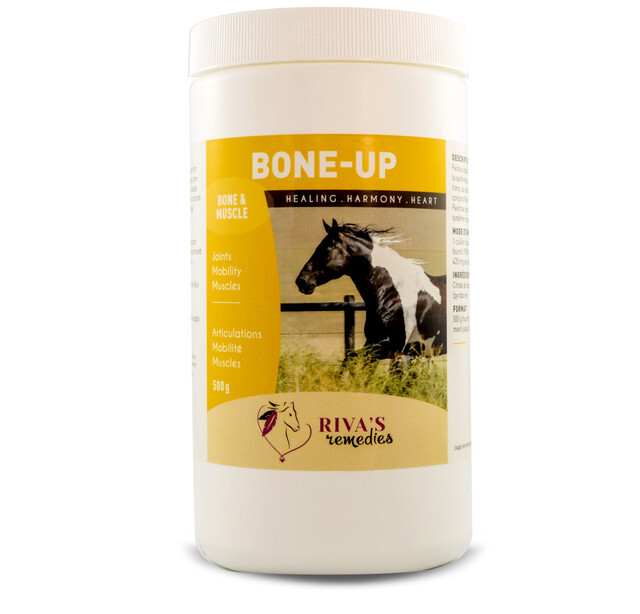 Bone-Up: 1 to 2 Tbsp daily - To help firm up the stool. May help reduce water content in the hindgut.
Bone-Up: 1 to 2 Tbsp daily - To help firm up the stool. May help reduce water content in the hindgut.
 Digestive Drops, homeopathic: One dose (5 to 10 sprays) once daily for seven to ten days or until the issue is resolved. (A proprietary blend of aloe, china, nat mur, podophyllum, silicea.) Contains remedies to help with digestive function in horses with a chronically loose or watery stool.
Digestive Drops, homeopathic: One dose (5 to 10 sprays) once daily for seven to ten days or until the issue is resolved. (A proprietary blend of aloe, china, nat mur, podophyllum, silicea.) Contains remedies to help with digestive function in horses with a chronically loose or watery stool.
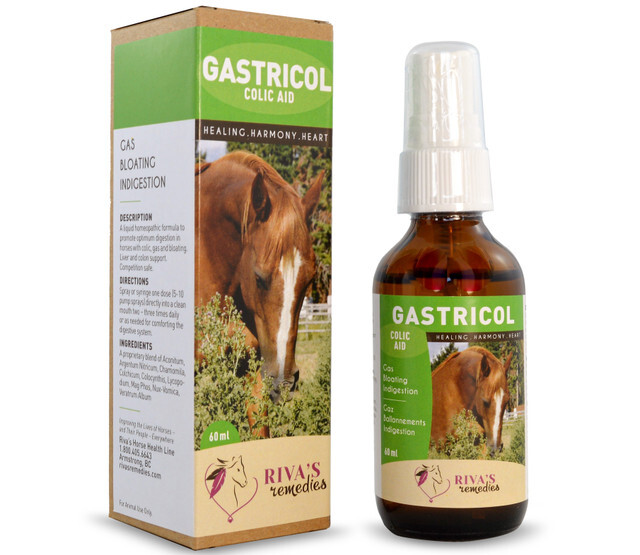 Gastricol, homeopathic: One dose (5 to 10 sprays) twice daily as needed. Supports digestive function as well as liver detoxification in horses with acute or chronic digestive issues including gas and bloating.
Gastricol, homeopathic: One dose (5 to 10 sprays) twice daily as needed. Supports digestive function as well as liver detoxification in horses with acute or chronic digestive issues including gas and bloating.
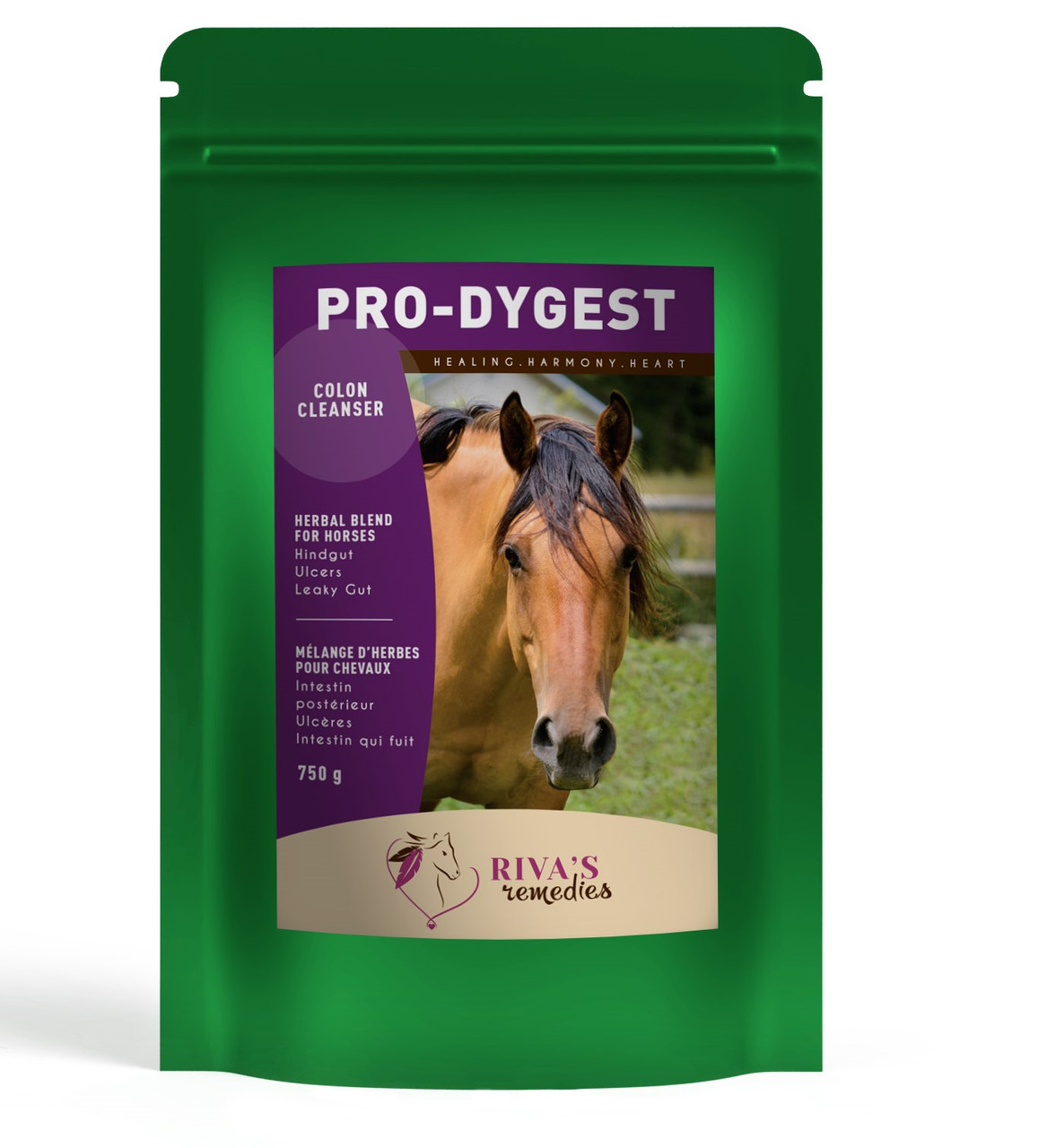 Pro-Dygest herbal blend: 2 Tbsp daily - Intestinal cleanser and detoxifier of debris, bacteria, and toxins. Natural demulcent. Bentonite is an adsorbent type of clay consisting mostly of montmorillonite, which is a type of smectite. Smectites are a soft hydrous silicate of aluminum found in soft clays. If needed, you may add an extra tablespoon of straight bentonite clay dissolved in a cup of water.
Pro-Dygest herbal blend: 2 Tbsp daily - Intestinal cleanser and detoxifier of debris, bacteria, and toxins. Natural demulcent. Bentonite is an adsorbent type of clay consisting mostly of montmorillonite, which is a type of smectite. Smectites are a soft hydrous silicate of aluminum found in soft clays. If needed, you may add an extra tablespoon of straight bentonite clay dissolved in a cup of water.
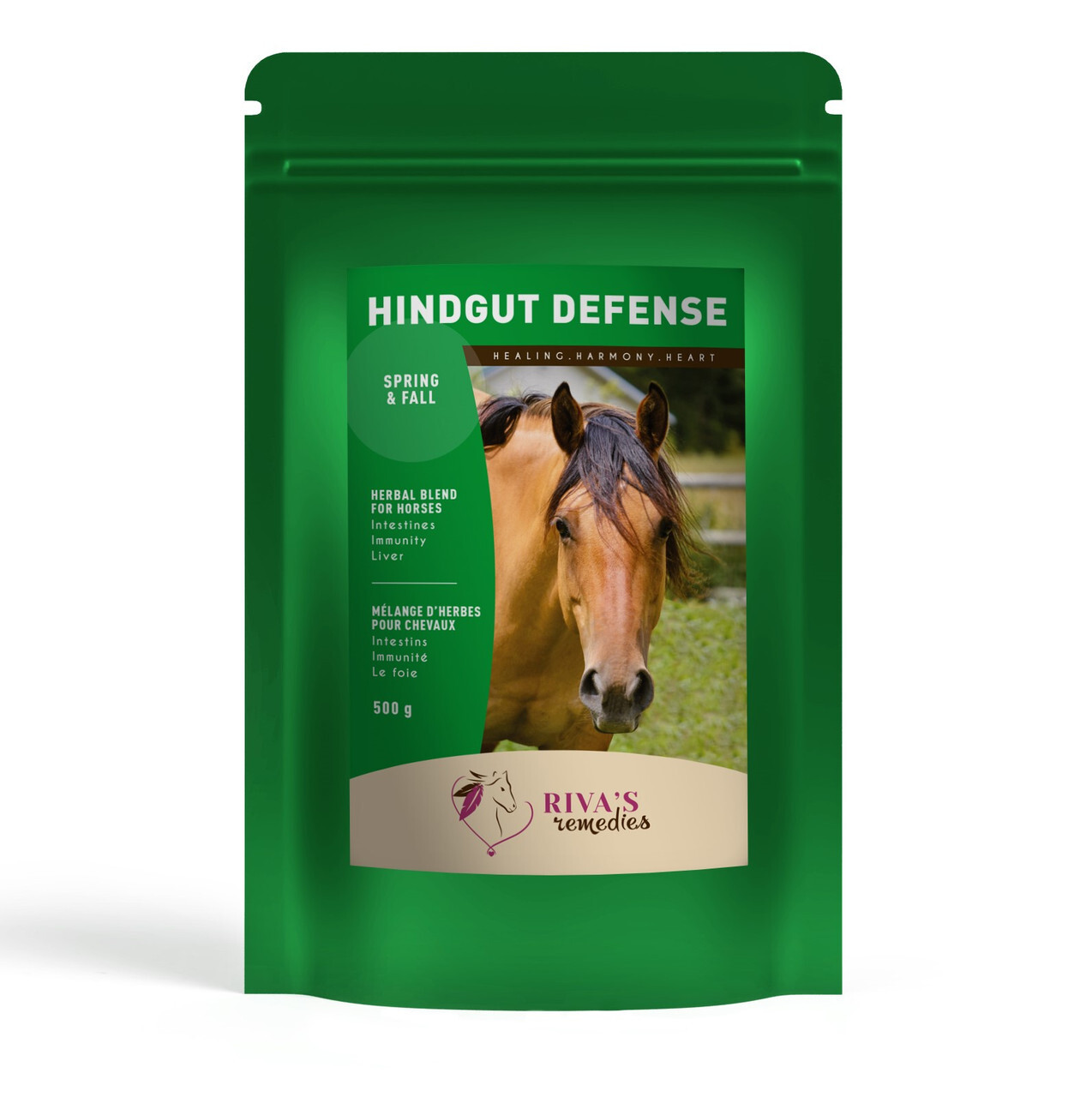 Hindgut Defense herbal blend: 2 Tbsp daily (A proprietary blend of sage, thyme, slippery elm, cayenne pepper, and garlic.) Supports the microbiome to help maintain resistance against bacteria, parasites, and yeast. Promotes liver and kidney health.
Hindgut Defense herbal blend: 2 Tbsp daily (A proprietary blend of sage, thyme, slippery elm, cayenne pepper, and garlic.) Supports the microbiome to help maintain resistance against bacteria, parasites, and yeast. Promotes liver and kidney health.

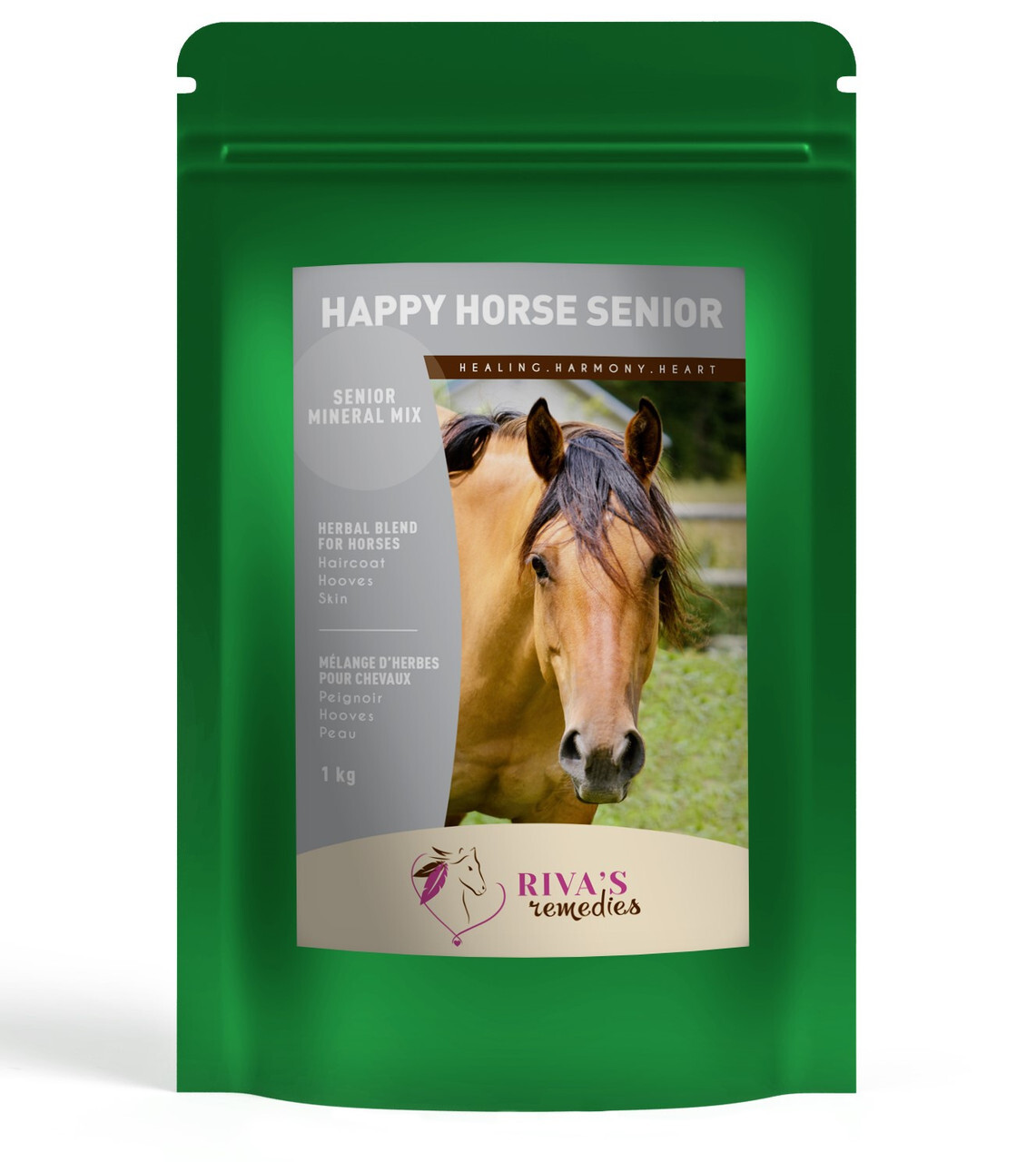 Happy Horse or Happy Horse Senior herbal blend: 2 Tbsp daily - A 100 percent plant and seaweed-based herbal mineral mix which includes extra fibre, blueberries, oat straw, and rosehips. Provides over 65 trace minerals, vitamins, and antioxidants to support digestion, immunity, and liver health. Also helps to maintain skin, hooves, and hair coat.
Happy Horse or Happy Horse Senior herbal blend: 2 Tbsp daily - A 100 percent plant and seaweed-based herbal mineral mix which includes extra fibre, blueberries, oat straw, and rosehips. Provides over 65 trace minerals, vitamins, and antioxidants to support digestion, immunity, and liver health. Also helps to maintain skin, hooves, and hair coat.
"I have a twenty-eight-year-old Canadian gelding who is on beet pulp this winter, which helps to alleviate his FWS. He is also on Happy Horse Senior. Three winters ago, he had a bad case of FWS, and I was beside myself trying to make him comfortable. Beet pulp and the Happy Horse Senior help soooo much!" —K.R. (Ontario)
Digestive Wellness
Horse owners can be challenged by Equine Fecal Water Syndrome but with a holistic approach, practical feed and lifestyle changes, horses can be guided back to digestive wellness. Explore the root causes that may be affecting your horse and make the lifestyle changes and natural health product selections that best matches your horse’s situation. Your horse deserves the best, and our natural horse health approach is here to make that a reality. Invest in their well-being today for healthier and happier horses tomorrow.
*Please note: We provide a thorough selection of our natural products to help you choose the ones that are best suited for your horse. If you need additional assistance in making the right choice, feel free to reach out to us.
